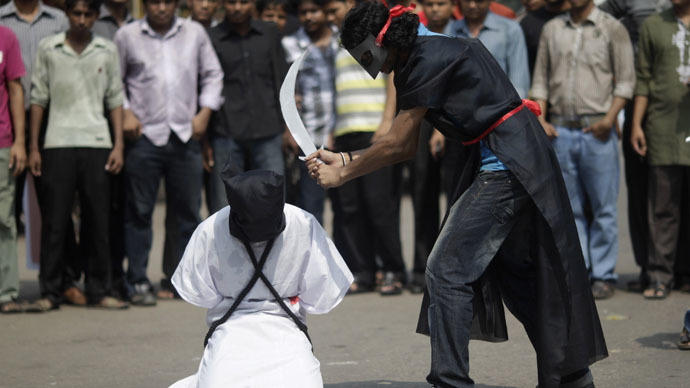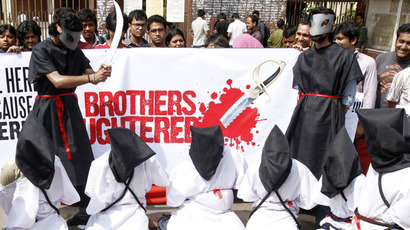Beheading of 5 foreigners in Saudi Arabia triggers outcry from human rights campaigners

Human rights groups have condemned Saudi Arabia after the beheading of five foreigners this week. Experts warn 2015 will mark a dramatic increase in public executions, as 80 people have already been killed, compared to 88 in the whole of 2014.
Despite mounting international criticism from foreign governments and human rights campaigners, Saudi Arabia has shown no willingness to end public executions. On Monday, a group of five men, sentenced to death for murder and theft, were publicly beheaded.
The killings come about a month after Amnesty International decried what it labeled as a “macabre spike” in state-sponsored executions.
#SaudiArabia today carried out its 80th execution of 2015 http://t.co/lUc6acjlny
— Adam Coogle (@cooglea) May 6, 2015
Adam Coogle, a Middle East analyst for Human Rights Watch, said: “From January to the end of July 2014 there were 15 executions, but they finished 2014 with 88, which shows clearly that the spike began last year and has continued," Coogle told the Independent.
Peggy Hicks, Global Advocacy Director at Human Rights Watch, called the jump in beheadings “shocking.”
Shocking increase in executions in #SaudiArabia. 79 in 2015 so far, 87 for all of 2014. Most by beheading. https://t.co/caOLAhUCc6
— Peggy Hicks (@hickspeggy) May 5, 2015
Amnesty International said the wave of state-sponsored killings proves that the change of leadership in the kingdom does not mean a change in how it views capital punishment, which is carried out for a series of offenses, including blasphemy, treason, murder and drug trafficking.
Indeed, since King Salman bin Abdul Aziz Al Saud ascended to the throne in Saudi Arabia earlier this year, the outlook for human rights remains grim, said Amnesty International.
READ MORE: Saudi Arabia execution rate 'truly unprecedented' - Amnesty Intl
“Any hopes that the arrival of King Salman bin Abdul Aziz Al Saud might herald an improvement in human rights in Saudi Arabia have been crushed,” said Philip Luther, Amnesty International’s Director of Middle East and North Africa programs.
Luther said the new king is overseeing an “ongoing crackdown on government critics and peaceful activists, who continue to be intimidated, arbitrarily detained and treated as criminals.”
“The first months of his reign have also been marked by an unprecedented wave of executions in a clear signal that the use of the death penalty is thriving in the Kingdom.”
LISTEN MORE:
Coogle, however, was hesitant to blame the jump in executions to King Salman’s accession in Saudi Arabia.
“Personally, I would hesitate to relate the spike to the change of leadership,” he said. “He certainly hasn’t done anything to stop it but the high rate really began last August. It could be an issue with a backlog of prisoners or it could just be that they are sentencing more people to death.”
Excluding China, where statistics are not released, at least state 607 executions were known to have been performed globally in 2014, Amnesty International said in a report released in March, compared to 778 in 2013, a decrease of more than 20 percent.
The report showed a dramatic jump in the number of death sentences handed down in 2014 compared to the previous year – at least 2,466 compared to 1,925 – an increase of more than 25 percent. The watchdog said the change was mostly due to the situation in Nigeria and Egypt, where hundreds of people were condemned to death.













